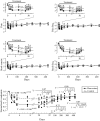Assessing the post-treatment therapeutic effect of pinaverium in irritable bowel syndrome: a randomized controlled trial
- PMID: 34230526
- PMCID: PMC8260803
- DOI: 10.1038/s41598-021-92990-7
Assessing the post-treatment therapeutic effect of pinaverium in irritable bowel syndrome: a randomized controlled trial
Abstract
Irritable bowel syndrome (IBS) is the most common gastrointestinal disorder significantly decreasing patients' lives of quality and placing huge economic burden on our society. Existing studies indicated that the therapeutic effects maintained for a period of time after the treatments were discontinued. It is clinically important to assess these post-treatment therapeutic effects (PTTE), which prevent IBS from relapsing. To assess the PTTE in pinaverium treatment and obtain high-quality evidence to justify the use of PTTE for long-term IBS management, we performed this controlled, double blind study on patients with IBS who were randomized to pinaverium 50 mg (n = 132) or placebo (n = 132), three times daily, for 4 weeks, and were followed up for 57 weeks after the treatments. The primary endpoints were abdominal pain and stool consistency. The secondary endpoints were pain frequency and stool frequency. The tertiary endpoints were global overall symptom and adverse events. Three days after pinaverium was discontinued, endpoints rebounded only 23.2-42.8% (P < 0.015 cf. placebo). The PTTE (P < 0.05 cf. placebo) lasted 9-17 weeks, which is similar to other antispasmodics with a 15-week treatment in striking contrast to ≥ 1 year PTTE in cognitive behavior therapy and < 1 week PTTE in serotonin antagonist treatment indicating that PTTE length markedly depends on the medication class used for the treatment and less depends on treatment length. After 17 weeks, the stage could be considered as an IBS natural history [no significant differences between pinaverium and placebo (all endpoints' P's > 0.05)], during which an average of 51.5-56.4% of patients (pool pinaverium and placebo data together) had IBS symptoms. These results provide clinical insights into efficient and cost-effective management of refractory IBS, and lend support to the IBS management that the selection of a therapy should consider both its effectiveness during treatment and its PTTE after the treatment.Trial registration number: NCT02330029 (16/08/2016).
Conflict of interest statement
The authors certify that they have no affiliations with or involvement in any organization or entity with any financial interest (such as honoraria; educational grants; participation in speakers’ bureaus; membership, employment, consultancies, stock ownership, or other equity interest; and expert testimony or patent-licensing arrangements), or non-financial interest (such as personal or professional relationships, affiliations, knowledge or beliefs) in the subject matter or materials discussed in this manuscript.
Figures



References
-
- Quigley, E. et al. Irritable bowel syndrome: a global perspective. World Gastroenterology Organisation Global Guideline 3 (2009).
-
- Torborg, L. Mayo Clinic Q and A: For most diagnosed with it, IBS is a chronic, lifelong condition. September 19, 2015. https://newsnetwork.mayoclinic.org/discussion/mayo-clinic-q-and-a-for-mo.... Accessed 30 June 2019.
Publication types
MeSH terms
Substances
Associated data
LinkOut - more resources
Full Text Sources
Medical

